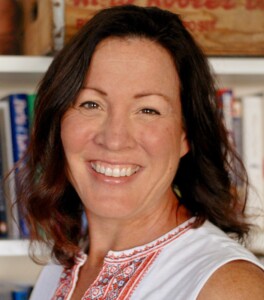Women Leaders … with Kelly Barbazette: PJIFF’s panel focuses on bringing more women into the industry
The PJIFF’s Women’s Panel left audience with a positive message.
![]()

The PJIFF Women’s Panel discusses ways to get more women involved in filmmaking. Photo by Marty Cheek
By Kelly Barbazette


Kelly Barbazette
The 18th Annual Poppy Jasper International Film Festival spanned five different cities from San Juan Bautista and Hollister to Gilroy, San Martin, and Morgan Hill April 10-17. I was thrilled to experience this cinematic arts event with my younger daughter. Annabelle’s short film was one of 270 chosen to be screened at the award-winning, eight-day film festival.
One of the events my daughter and I were most looking forward to attending was the Women’s Panel discussion featuring five prominent women in the film industry. They shared the stage at the Morgan Hill Community Playhouse April 12 to discuss how to uplift women and work towards the goal of increasing women’s presence and leadership in filmmaking.
Mattie Scariot, director of the PJIFF, shared how as a child she saw a movie poster and didn’t see women’s names credited as the writer, director or producer. She added women at the time often worked as costume or makeup artists.
Panel moderator Zoe Elton, film curator, writer, and creator of the Mind the Gap initiative, which addresses gender equity in film, said the number of women directors hasn’t changed in 20 years, representing only 7 percent of movies.
 Catherine Joy White, an actor, writer, filmmaker, gender advisor to the United Nations, and CEO of Kusini Productions, said she asks herself how she can affect change when she experiences the disparity between the life she’s living and what she sees on screen.
Catherine Joy White, an actor, writer, filmmaker, gender advisor to the United Nations, and CEO of Kusini Productions, said she asks herself how she can affect change when she experiences the disparity between the life she’s living and what she sees on screen.
“I always think of 5-year-old me,” Joy White said. “If we don’t see ourselves, what world are they growing up in? And I think about being the bridge.”
CEO and co-founder of NRJ Media Group Norma Garcia Muro said in 1983, at the start of her career at Paramount Pictures, she was told that she wouldn’t advance in the ranks. She said she has used that challenge as a motivator to help bring about change in the industry.
“The solution I’ve found is to help the next generation and mentoring and help them rise through the ranks.”
Takia “Tizzi” Green, a writer, director, and producer, said when she began her career at Sony Pictures in 1997, she was one of the few women of color in the industry. She said she also mentors youths in inner cities in Los Angeles.
“When you make it, whatever your success is, you make sure you bring someone else up,” she advised the audience.
Venus Jones, a poet, artist, and activist, encouraged filmmakers not to be afraid of making mistakes and helping others.
Green said she is hopeful of industry trends shifting from big Hollywood-budget movies to independent films, enabling more people to tell their stories.
Garcia Muro also encouraged young filmmakers to not let fear and anxiety deter them and to seek a sponsor, someone of influence, to help them step forward into the spotlight.
“If you’re not seeing the change, be the change,” she added.
Writer-director Sukki Menon, who is known for her Netflix docu-series “Singapore Social,” noted she and all her peers work extraordinarily hard, and the only way the industry will be more inclusive is if women collaborate and “let others in.”
“No one can replicate our lived experiences,” she said.
Joy White said that nothing changes if it isn’t challenged. Challenging the status quo can start with changing the community around you and believing that you have the right to be where you are, she said.
“There’s a vision there. I think we can do this,” Elton said.
Annabelle and I agreed that the PJIFF’s Women’s Panel left us with a positive message. Women filmmakers have a brighter future if they continue to collaborate, lift up other films made by women, challenge barriers in the industry, and continue to tell stories that are true to their voices and experiences.
Kelly Barbazette is a freelance writer who has lived in Gilroy for more than 20 years.
- Family fun: Christopher High School’s Got Talent! 8 p.m. May 18 - May 14, 2024
- Guest column by Kiera Gallagher: Country concert helps women in Africa build a well for clean water - May 11, 2024
- Downtown Gilroy .. with Jeff Orth: Downtown Gilroy is blooming with exciting new developments - May 11, 2024

